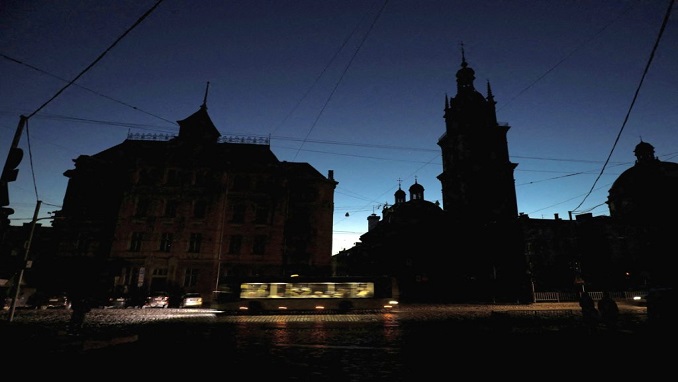Ukrainians are facing the first large-scale nationwide blackouts after Russian attacks damaged 30 percent of power stations in Ukraine in just over a week. Grid operator Ukrenergo announced that officials restricted power supply between 7 am and 11 pm on Thursday to give energy companies time to repair facilities, warning that temporary blackouts are also possible if people did not comply with the curbs.
Although there’s no schedule announced for outages, larger cities like Kyiv and Kharkiv announced curbing the use of electric-powered public transport and reducing the frequency of trains on the metro. President Zelensky has also appealed for Ukrainians to limit their electricity consumption and the use of appliances that consume a lot of energy, informing that three more energy facilities had been hit by attacks on Wednesday, including the major, coal-fired thermal power station in Burshtyn in western Ukraine.
Ukrainian officials said Thursday that Russian strikes on an energy infrastructure facility and an industrial area in Ukraine’s central Kryvyi Rih region overnight caused serious destruction at the Kryvyi Rih power facility. The head of Dnipropetrovsk’s regional military administration Valentyn Reznichenko said on Telegram Thursday that they’ve spent a nerve-wracking night in the Kryvyi Rih, noting that, fortunately, initial reports are of no casualties.
Previously on Wednesday, Kryvyi Rih Mayor Oleksandr Vilkul confirmed that due to an overnight strike on an energy infrastructure facility, parts of the city were without electricity.

Meanwhile in the United States, if the Republican Party takes control of Congress in the midterm elections on November 8, the extensive assistance provided by Washington to Ukraine amid its conflict with Russia may be cut. According to the Republican Study Committee’s (RSC) Chairman, Congressman Jim Banks, GOP will focus on domestic issues after the midterms since they believe one can’t lead abroad when so weak at home.
There’s been a noticeable shift away from the previous broad bipartisan consensus on providing aid to Kyiv even among the harshest GOP critics of Vladimir Putin, Axios noted, citing House minority leader Kevin McCarthy who pointed out that people are not going to write a blank check to Ukraine anymore. In an interview with Punchbowl News earlier this week, McCarthy, who compared Putin to Hitler, insisted that while Ukraine might be necessary, it can’t be the only thing on the US administration’s agenda.
Commenting on McCarthy’s remarks, White House spokeswoman Karine Jean-Pierre insisted that the Biden administration will keep working with Congress to support Kyiv regardless of the outcome of November’s vote, reminding that it’s a commitment that President Biden made to Ukrainian counterpart Volodimir Zelensky.
Republican Congressman Kelly Armstrong believes that the mood swing among the Republicans was likely a result of the feedback that the lawmakers had been getting from their constituents. He pointed out that Ukraine is the furthest thing from people’s minds when they’re seeing doubled utility bills, a 13% increase in grocery prices, and when they’re being overrun by migrants and fentanyl in border communities.
When it comes to Ukraine, the party is united on at least one position: that there should be a thorough accounting of every dollar sent. Although a reduction or halt in US military aid to Ukraine would create a geopolitical earthquake with the potential to alter Putin’s war trajectory, White House aides confirmed that the Biden administration hadn’t warned Kyiv about the possibility of US aid coming to an end.
